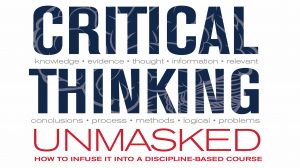 OXFORD, Miss. – The University of Mississippi is kicking off the implementation of its Quality Enhancement Plan focusing on critical thinking with a Feb. 2 lecture by an expert in the field.
OXFORD, Miss. – The University of Mississippi is kicking off the implementation of its Quality Enhancement Plan focusing on critical thinking with a Feb. 2 lecture by an expert in the field.
Linda B. Nilson, author and director emerita of the Office of Teaching Effectiveness and Innovation at Clemson University, will discuss “Critical Thinking Unmasked: How to Infuse It into a Discipline-Based Course?” as a kickoff event for the plan. The talk, at 3:30 p.m. in the Jackson Avenue Center, Auditorium A, is directed toward faculty. It is free, and a reception follows.
The Quality Enhancement Plan is part of the university’s reaccreditation process with the Southern Association of Colleges and Schools Commission on Colleges.
The talk “focuses on teaching students to improve their critical thinking skills, especially in large-enrollment, lower-division courses,” Nilson said.
“Critical thinking is challenging to learn, and it requires a great deal of practice in varied contexts, both within and outside of courses. The earlier students begin thinking critically, the more likely they will leave college with the necessary skills and the habit of doing it.”
Critical thinking is not taught automatically while focusing on disciplinary material, Nilson said. Rather, faculty have to set out consciously to teach critical thinking by having critical thinking learning outcomes, using certain methods and building certain activities into a course.
“These methods and activities involve asking students questions and ensuring students answer them thoughtfully and ensuring they get some kind of feedback on their answers from you or their peers,” Nilson said. “I hope attendees gain the ability to integrate critical thinking into their courses with confidence and ease, as well as a concrete understanding of what critical thinking is in their discipline.”
The university stands for reaccreditation every 10 years, said Richard Forgette, associate provost. Part of the process requires the university to reaffirm or demonstrate how it meets common quality principles.
The process also requires that the university advance a campuswide academic initiative in the form of a Quality Enhancement Plan that improves an aspect of student learning or the environment for student success.
“The selection of critical thinking as our QEP topic followed from intensive, faculty-led planning processes evaluating our academic mission and needs,” Forgette said.
The topic of critical thinking was chosen by a committee of faculty, staff, administrators and students that used surveys and university assessment information.
“The purpose of Dr. Nilson’s visit is to begin a campus conversation about critical thinking,” Forgette said.
Nilson is the author or co-author of several books, including “Teaching at Its Best: A Research-Based Resource for College Instructors,” the fourth edition of which was released in 2016, and “Creating Engaging Discussions Strategies for ‘Avoiding Crickets’ in Any Size Classroom and Online,” which is being published in April.
Before her career at Clemson, Nilson was director of the Center for Teaching at Vanderbilt University. She previously taught at universities in California, and also served as a business editor of a quarterly business magazine covering the Inland Empire region of California.
Nilson earned her bachelor’s degree in sociology from the University of California at Berkeley and her master’s and doctoral degrees in sociology from the University of Wisconsin at Madison.
A member of several higher education teaching and innovation boards, Nilson also is a lifetime member of Mensa International.
While critical thinking is a “deeply misunderstood cognitive skill set,” Nilson said her session will offer faculty “reliable, practical and easy-to-follow course design, assessment and pedagogical principles from a synthesis of the various perspectives.”
Students also can improve their critical thinking skills, Nilson said.
“Students need to read, watch and listen to new material, whether academic material or the daily news, with a series to questions in their mind to answer,” she said. “These questions include analyzing and evaluating things like the reliability of the information source, the interests of the source, the evidence behind the claim and any controversy surrounding it.
“Faculty can teach students what these questions are by asking them in class and on assignments.”